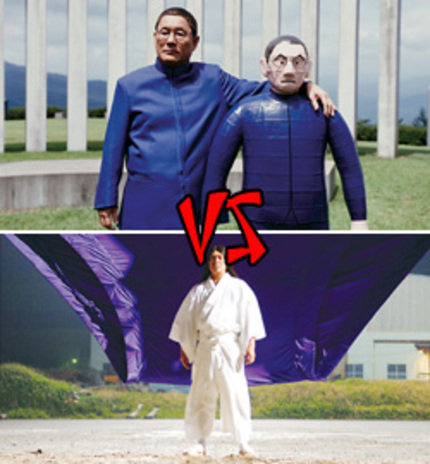TIFF Report: Battle of the Japanese comedy giants - Glory to the Filmmaker and Dai Nipponjin

By sheer stroke of genius or dumb luck the festival gods smiled upon me and I saw two Japanese films yesterday that were at the center of a controversy during another film festival. Two Japanese comedy icons both had films ready and waiting to be screened at the prestigious festival yet only one was chosen. Director and star Hitoshi Matsumoto had his debut film Dai Nipponjin and long time director and star Takeshi Kitano had his film Glory to the Filmmaker! The debut film from Hitoshi, the former Kitano comedy gang member, was chosen for the festival. Tempers flared, words were said [“I hope my film’s the only hit, and the rest bomb.”], and both films battled at the box office with Hitoshi’s film emerging as the clear winner, clubbing the former with his giant Baddie beating stick. Having gone 2 for 2 will Hitoshi earn the hat-trick?
The answering is yes. Though both pictures have their issues it is clear that one star is on the rise and another is on the decline.
In Glory to the Filmmaker! Kitano continues to look inward and create films that are not for critics or audiences, as he said. His second film in what he has said will be a trilogy follows Takeshi Kitano as he searches for a sure hit after announcing he will no longer make Yakuza films. The film is narrated by his producer who will or will not approve a budget for this next film. Kitano then proceeds to observe trends in Japanese film history, observing with a critical eye but still trying to revive popular genres, but to no avail as the ideas are too much for the producer to stomach, be they outdated, too expensive or too cheap. He then settles on a story of two con-artists who are after ‘Beat’ Takeshi and this is when the film goes downhill into a number of uninspiring vignettes and the film loses any magic. Events are set in motion that will bring about the end of the world he has created, perhaps also signaling what he thinks will be the demise of the Japanese film industry as all his ideas and genres he visited are eventually consumed in the hellfire.
In Dai Nipponjin a film crew is interviewing Daisato, a seemingly uninteresting man who leads a quiet life with stray cats in his slanderous graffiti covered home. Daisato is waiting to be called for work. It could be today. It could be tomorrow. It could be six months from now. But, he has to be ready when called for he is the sixth generation in a family of gigantic superheroes called upon by the government to dispatch equally large monsters with comb over hair, single legs, farts of 10,000 men or hyper violent creatures sent in from Korea. He is under-paid, unloved and under appreciated by the government, his wife and daughter, and the citizens of Japan. Dai Nipponjin offers a unique look at hero worship in Japan delivered totally straight and deadpan.
Both pictures suffer from an over-long running time –both just under 2 hours- which results in 2 stories that are stretched beyond their limits, one far more than the other; typically Japanese films run longer than western audiences’ patience does anyways. The problem with Kitano is that he’s contradicting himself in his own film. He creates a tale involving himself looking for a sure-fire box office winning film but in real life he doesn’t want to make film for audiences or critics. Regardless if it his opinion saying that Japan is making more horror films hoping to sell to America for remake rights his character's purpose is still contradictory to his own film making philosophy. He started to lose his fan base when he did Kitanos, I imagine those numbers will get fewer if he continues to put out films like this. Though there are some funny moments in his comedy there isn’t enough there to keep us invested in it, especially as the second half wears on, and when the hell-fire comes we welcome that like the coming rain to wash out a dry land. Hitoshi’s script is funnier with far more inspired moments including scenes where Daisato tries to have a civil conversation with the stink monster and encourage him to leave town instead of fighting, and, the scenes of his grandfather, 'The 4th' as tall as an office building, roaming the streets of Tokyo. ‘Grandfather salutes the sun!’ And though the ending takes an abrupt turn one cannot deny that the conversation around the dinner table during the end credits is some of the best dinner conversation they will ever hear/read.
Of the two films embroiled in this controversy Dai Nipponjin has emerged as the clear winner both in Japan and in the mind of this reviewer. Its subject matter and subject are more inspired. The circumstances are more outlandish and creative and I think it delivers far better laughs than Glory. And if there were any debate about that then may I suggest that we take the guy sitting the next row down from me and to my left at the Kitano screening and the woman sitting about halfway up the left section at the Hitoshi screening and let them debate about which movie was funnier because they both laughed at EVERYTHING in the respected films. Someone would run out of breath eventually and we would declare the winner the last one laughing.







